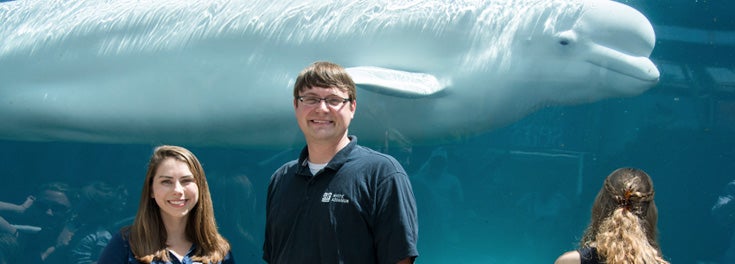 Opportunities to participate in hands-on research with whales, especially whales that live in the Arctic, don’t come up very often. But eleven URI undergraduates played key roles in a recently completed research project on beluga whales, the white whale that lives in the polar regions of Alaska and Canada.
Opportunities to participate in hands-on research with whales, especially whales that live in the Arctic, don’t come up very often. But eleven URI undergraduates played key roles in a recently completed research project on beluga whales, the white whale that lives in the polar regions of Alaska and Canada.
The students helped post-doctoral researcher Justin Richard identify a non-invasive method of determining the reproductive status of the 15-foot whales. The students collected samples of beluga “breath” from animals at nearby Mystic Aquarium, isolated their DNA, conducted behavioral observations, assisted with ultrasounds of the whales, and much more.
Being able to learn from the animals was really cool…I also learned that I enjoy research.
“The students were involved in all aspects of the project,” Justin said. “The project wouldn’t have happened without their help.”
His objective was to correlate the whales’ reproductive physiology with observed changes in their behavior, something that cannot be determined by observing the animals in their ice-covered Arctic habitat. But to accomplish this, he needed help. And plenty of students volunteered to participate during the four-year project.
“My job was to film the beluga whales and then go through the video and record which whales were interacting with each other and for how long,” said Dan Catizone, who graduated last year and now conducts sea turtle research for the U.S. Geological Survey. “It was great to spend time at the aquarium observing these magnificent animals.”
Rachael Desfosses was also on the video team, which led to an internship at the aquarium. She hopes to become a marine mammal trainer, and she figured that working with the beluga whales would be an excellent first step.
“I gained a lot of insight into beluga whale behavior, and it reinforced that I really do want to become a trainer,” said Rachael. “Being able to learn from the animals was really cool, and after watching hours upon hours of beluga whale behavior and interactions, I learned a lot about them individually. But I also learned that I enjoy research.”
All of the participating students agree that the experience provided by the unique research opportunity were highpoints in their URI academic careers.
“I strongly believe that participating in Justin’s research strengthened my application for veterinary school,” said Krystle Schultz, who helped develop a way to determine a beluga whale’s maternal lineage based on DNA isolated from its breath. “Even though I’m not seeking a career in research or exotic medicine, this experience was invaluable, and I would encourage current and future science majors to get involved in this kind of research.”
Pictured above: Rachael Desfosses and Justin Richard
